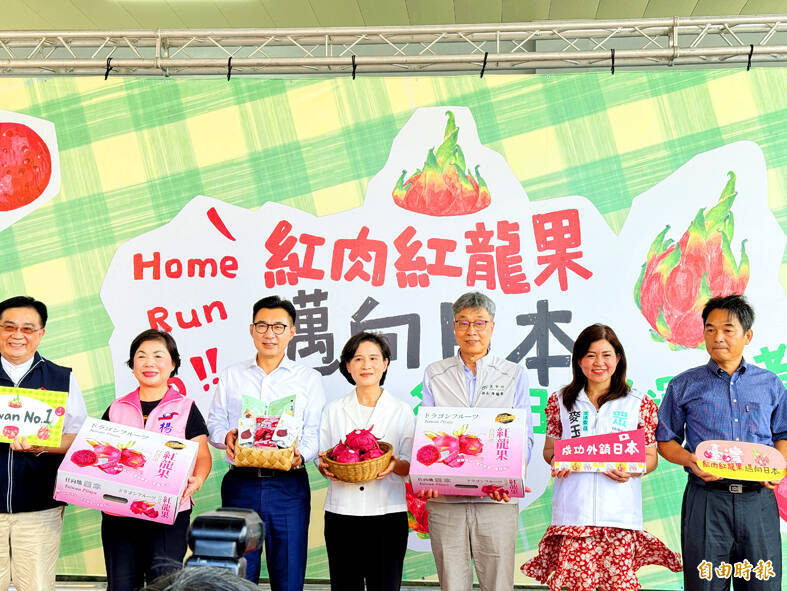《TAIPEI TIMES》TPP legislator apologizes for taking Taiwanese dragon fruit to Vietnam

Taiwan People’s Party Legislator Mach Ngoc Tran, second right, attends an event on Wednesday in Taichung marking the first export of red dragon fruit to Japan. Photo: Ou Su-mei, Taipei Times
By Ou Su-mei and Jason Pan / Staff reporter
Taiwan People’s Party (TPP) Legislator Mach Ngoc Tran (麥玉珍) yesterday apologized for hiding cuttings of dragon fruit inside her luggage to plant them at her family home in Vietnam decades ago, which officials said was illegal.
Mach related the story on Wednesday during an event in Taichung’s Fongyuan District (豐原) organized by the Ministry of Agriculture to mark the first batch of red dragon fruit export to Japan.
After lawmakers and agriculture officials said it is illegal to export plants, fruits and seeds without government approval, Mach apologized at a legislative meeting yesterday.
“Now I know what I did was wrong, and hope people would not contravene the law like I did,” she said. “That was about 30 years ago. At the time I was not aware of the prohibition and I would not do so now, knowing it is against the law.”
“I have also received messages asking for help, because when migrant workers and new residents come to Taiwan, unaware of the prohibition, they often carry many different items that are seized by customs, which might cause them to be denied entry,” Mach added.
Mach said she was reminded by party colleagues to be more prudent when making public comments.
Vice Premier Cheng Li-chun (鄭麗君) said at the event that it took eight years of diligent effort by stakeholders to enable the first shipment of red dragon fruit to Japan.
A lot of work was needed to ensure stable and high-quality production to pass Tokyo’s tests, she added.
“Taiwan is known as a ‘fruit kingdom’... My kids love to eat red dragon fruit,” she said.
“It has been a difficult journey of eight years, but we are ready to share the fruit with our Japanese friends. This is an important milestone and it can boost our friendly relations with Japan, a major export market for Taiwanese agricultural products,” she added.
When it was Mach’s turn to speak, she told a story about her taking cuttings of dragon fruit from Taiwan to Vietnam.
“Back in my hometown in Vietnam, my family has a 10-hectare farm for growing coffee, fruits and other produce. In Vietnam, we used to only have white dragon fruit. After coming to Taiwan, I was delighted with the sweet-tasting red dragon fruit,” she said. “So I made cuttings of red dragon fruit cactus and put it inside my luggage when I took a flight back to Vietnam to grow it at my family farm.”
Her remarks immediately drew a backlash as a lot of people in the audience knew it is illegal to export Taiwanese fruits and seeds without government approval.
“The variety could not adapt to conditions in Vietnam, and we could not grow it there,” Mach later said.
“I have found that Taiwanese fruits and vegetables are very tasty, and I always promote them at international events,” she said. “Everyone should help promote it to all parts of the world.”
Minister of Agriculture Chen Junne-jih (陳駿季) said that Mach might have been joking.
“Or maybe it did happen, but I urge people to know that cultivars and seeds came from the painstaking efforts of our farmers. We must protect our leading edge in fruit production, and must not take Taiwan-produced seeds and cultivars to other countries,” Chen said.
Democratic Progressive Party (DPP) Legislator Huang Jie (黃捷) said that the TPP legislator contravened Article 51 of the Plant Variety and Plant Seed Act (植物品種及種苗法), which includes a maximum fine of NT$2.5 million (US$76,970).
Mach later on Wednesday apologized, saying that as a new resident of Taiwan, she was not familiar with the law at the time.
“I offer my sincere apology on this matter, and am grateful for people’s understanding and acceptance,” she said. “My intention was to use my own experience to remind people to abide by the regulations.”
Mach became a naturalized citizen after marrying a Taiwanese man in 1994, settling in Changhua County. She later divorced him, citing domestic violence.
She worked as a Vietnamese-language interpreter for local police and government agencies, and later founded associations for new residents from Southeast Asia, China and other countries.
Born in Bien Hoa Province, Vietnam, Mach said her family members are farmers there.
TPP included her in the party’s legislator-at-large list before the Jan. 13 election citing her advocacy for new residents and migrants. She has been serving as a legislator since February.
新聞來源:TAIPEI TIMES

















